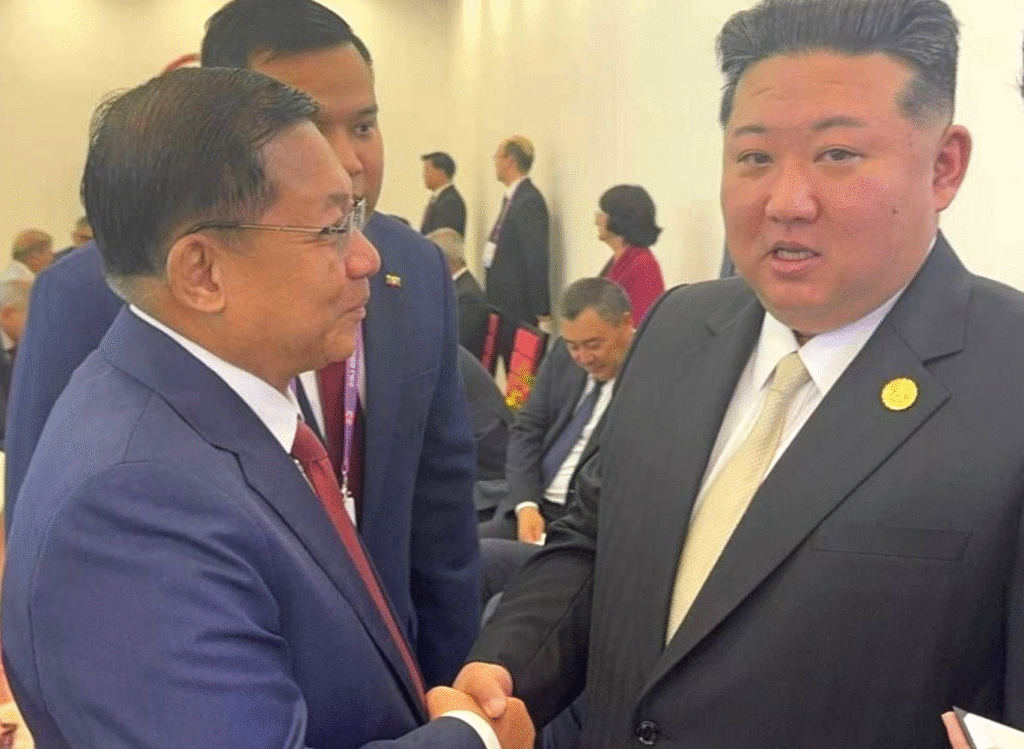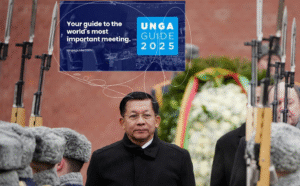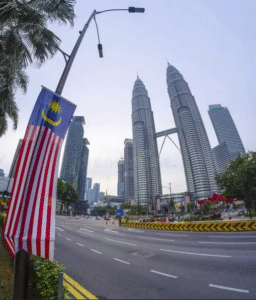Translated and edited from Ko Hla Soewai‘s post and Khit Thit Media’s news.
Min Aung Hlaing’s Moscow tilt deepens isolation as Washington turns to Bangladesh
The United States has stepped up pressure on Myanmar’s military regime, accusing it of building an illegal arms procurement network with North Korean suppliers. The move signals renewed American interest in Myanmar’s trajectory — just as Senior General Min Aung Hlaing clings to Russia and China to prop up his failing rule.
Junta’s Desperation on Display
Long abandoned is Myanmar’s proud “non-aligned” foreign policy. Min Aung Hlaing now parades himself at international forums far above his rank, desperately seeking recognition. Unlike generals Ne Win or Than Shwe, who kept their distance from such humiliations, Min Aung Hlaing’s behavior reveals the insecurity of a man struggling to prove his legitimacy.
Washington Reopens the Nuclear File

On September 25, the U.S. State Department announced new sanctions, citing Myanmar’s attempts to secure arms through North Korean networks. The sanctions targeted Royal Shune Lei Company and its executives Kyaw Thu Myo Myint, Tin Myo Aung, and Aung Ko Ko Oo, who act as intermediaries for the Myanmar Air Force. On the North Korean side, Beijing-based 2210 General Bureau and intelligence operatives were named.
American officials warned that the junta’s actions not only fuel internal atrocities — including airstrikes on civilian infrastructure — but also contribute to North Korea’s revenues, sustaining Pyongyang’s global threat.
Sanctions With Bite
The penalties were imposed under U.S. Executive Orders 13678, 13551, and 14014. As one U.S. Treasury official put it, North Korea’s arms trade “directly threatens the United States and its allies.” Min Aung Hlaing’s lavish attempts to buy diplomatic favor with cash handouts are proving futile — “like pouring water into sand.”
Kazakhstan Stop, Russian Embrace
During his Russian tour, Min Aung Hlaing plans to stage a stop in Kazakhstan — a little-known gesture meant to showcase international partnership. Yet his trajectory underscores the junta’s growing isolation, tethering Myanmar’s future to Moscow and Beijing.
Strategic Stakes in the Bay of Bengal
Bangladesh Shifts West
While Myanmar drifts, Washington’s gaze is shifting toward Bangladesh. On September 10, 120 U.S. soldiers arrived there, highlighting Dhaka’s growing defense cooperation with the West.
Repeated crashes of Chinese-made K-8W and F-7BGI fighter jets between 2018 and 2025, one of which killed 20 schoolchildren and injured 200 others, have shaken confidence in Beijing’s weapons. Defective tanks, radars, and munitions have only deepened the distrust. With instability spilling from Myanmar and tensions along the Indian border, Dhaka no longer trusts Chinese arms and is turning to Washington instead.
Strategic Stakes in the Bay of Bengal
Analysts warn that Myanmar’s turmoil — refugee flows, renewed Rohingya displacement, and cross-border clashes — risks pulling neighbors into crisis. Bangladesh’s pivot to the U.S. could reshape the Bay of Bengal’s entire security balance, challenging China’s influence in South Asia.
The Inevitable Verdict
As Min Aung Hlaing digs Myanmar deeper into dependency on Moscow and Beijing, America is quietly redrawing the map around him. The people’s just war will not be crushed. Victory is certain.
As Min Aung Hlaing clings to Moscow and Beijing, the tide of history moves elsewhere. The people’s just war will surely triumph.
Following is translated and edited from Khit Thit Media.
U.S. Sanctions Myanmar–North Korea Arms Network
Royal Shune Lei and key junta-linked brokers exposed in illicit weapons trade
The United States has escalated its crackdown on Myanmar’s military regime, blacklisting five individuals and one company for brokering weapons deals between North Korea and the Myanmar junta. The sanctions target both sides of the illicit trade, cutting off revenue streams crucial to Pyongyang while tightening the noose on Min Aung Hlaing’s generals.
The Sanctioned Network
At the heart of the scheme is Royal Shune Lei Co. Ltd., a Myanmar company long acting as a broker for the Air Force. Its executives Kyaw Thu Myo Myint, Tin Myo Aung (CEO), and Aung Ko Ko Oo (Director) have been sanctioned for facilitating purchases of bombs, surveillance equipment, and guidance systems from North Korea’s notorious Korea Mining Development Trading Corporation (KOMID).
According to U.S. officials, KOMID’s Beijing-based representative Kim Yong Ju coordinated with Royal Shune Lei staff during 2022–2023 to arrange weapons sales. In late 2023, Royal Shune Lei executives traveled to China to negotiate further purchases and even sought North Korean visas for Myanmar delegations through Beijing.
Weapons and Deals
Evidence shows KOMID supplied aerial bombs, bomb guidance devices, and surveillance equipment to the Myanmar military through Royal Shune Lei. Sample guidance systems were even delivered for testing, with the expectation of final sales.
Meanwhile, Royal Shune Lei’s Director Aung Ko Ko Oo directly oversaw parts of the operation, making the company a central hub of the junta’s arms pipeline.
International Action
The sanctions announced on September 25 follow earlier penalties:
- Canada and the UK sanctioned Royal Shune Lei in October 2024.
- The European Union imposed sanctions in December 2023.
Now Washington has moved to align pressure, sanctioning not only the Myanmar brokers but also North Korean counterparts Kim Yong Ju (KOMID representative) and Nam Chol Ung from North Korea’s intelligence services.
Why It Matters
“The DPRK’s unlawful weapons programs directly threaten the United States and its allies. We will dismantle the financial networks enabling them,” declared John K. Hurley, Deputy Assistant Secretary for Counterterrorism and Financial Intelligence at the U.S. Treasury.
Analysts note that cutting off Myanmar’s weapons channels is also intended to weaken North Korea’s revenue base while constraining the junta’s ability to maintain its brutal air campaign against civilians.
Conclusion
Royal Shune Lei’s exposure highlights how Myanmar’s generals have mortgaged the nation’s sovereignty to shady arms deals — drawing sanctions not just from the West, but increasingly from multiple international actors. As Min Aung Hlaing clings to Moscow and Beijing, his regime is now trapped in an ever-tightening sanctions web.





